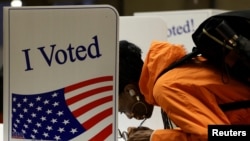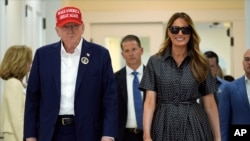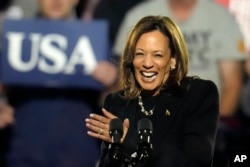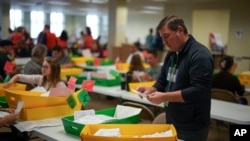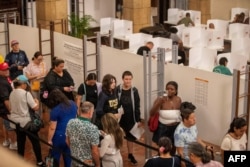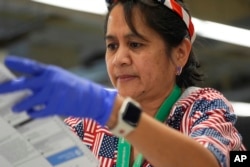Poll results began pouring in late Tuesday in the tight presidential contest between Vice President Kamala Harris and former President Donald Trump, with both notching early wins in their respective strongholds in a historic poll that could see the U.S. elect its first female president.
Trump, who is seeking to return to the White House after his 2020 loss, grabbed his home state of Florida, swinging the early tally into his column with that state’s 30 electoral college votes. Harris, as expected, locked down several smaller states on the East Coast. The winning candidate needs 270 electoral college votes, out of 538, to win, and some states were not expected to finish counting before Wednesday. The winner will begin a four-year presidential term in January.
Political analysts predicted that the race would come down to just seven political battleground states, where surveys show the two candidates are within 2 percentage points of each other — making them too close to call.
Watch related report by Kane Farabaugh:
Jim Kessler, vice president of policy at think tank Third Way, told VOA late Tuesday that Harris offers something new to a particular demographic of voters.
“I think part of it is that she’s a woman, and a woman of color,” he said of Harris, who is of mixed Black and South Asian heritage. “And I think many women are excited about that.”
Another point in her favor, he said, is the Supreme Court’s 2022 decision to overturn federally protected abortion access. Harris has campaigned on a platform of codifying those protections into law.
“Literally, since that decision, Democrats have overperformed the public opinion polls, in part because women are showing up at the polls in higher numbers than men, especially compared to previous elections,” he said.
Trump, who voted in Florida Tuesday, said he was confident in his performance.
He told reporters, “If it’s a fair election, I’d be the first one to acknowledge” the results, though it was not clear what might meet that definition. Democratic critics say they expect Trump to challenge the outcome unless he wins.
Both Harris and Trump have assembled a vast roster of experienced election lawyers to contest any irregularities they believe might affect the outcome to their candidate’s disadvantage.
More than 83 million Americans cast early votes before Tuesday, either in person at polling stations or by mail.
The total is more than half the 158 million who voted in the 2020 election, when President Joe Biden defeated Trump. It was a Democratic victory that to this day Trump says he was cheated out of by fraudulent voting rules and vote counts.
Biden remained at the White House throughout the day and made no public appearances.
A Trump victory would make him only the second president to serve two non-consecutive terms, after Grover Cleveland in the 1880s. He would also be the first felon to serve as president as he awaits sentencing later in November after being convicted of 34 charges linked to his hush money payment to a porn film star ahead of his successful 2016 run for the presidency.
Harris for weeks has claimed she is the underdog in the campaign but lately expressed more optimism and now says she expects to become the country’s 47th president.
U.S. presidential elections are not decided by the national popular vote but through the Electoral College, which turns the election into 50 state-by-state contests, with 48 states awarding all their electoral votes to the winner in those states. Nebraska and Maine allocate theirs by both statewide and congressional district vote counts.
The number of electoral votes in each state is based on population, so the biggest states hold the most sway in determining the overall national outcome. Aside from the 19 electoral votes at stake in Pennsylvania, two other battleground states, Georgia and North Carolina, have 16 apiece, and Michigan has 15.
Voters near the nation’s capital told VOA that their exercise in democracy was a pleasant one.
Voting was “just a smooth process,” said Arlington, Virginia, voter Neil Puri. “Civility. Having people respect each other again and vote with love rather than party lines.”
And in Alabama — a state Trump claimed early in the evening — Pastor Robby Boyd told VOA’s Lao Service that he had faith in a smooth outcome.
“My biggest concern is that there are questions that linger no matter who wins, that there are questions or charges of fraud,” he said. “We don’t want that to happen. I just pray that it’s so obvious whoever the winner is, that we can move on as a country.”
VOA’s Kim Lewis contributed to this report.
This post was originally published on here


